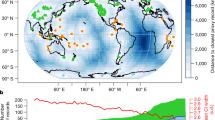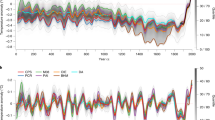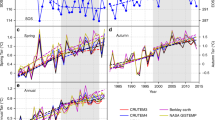Abstract
Bias is introduced into almost all recent reports of climate-related trends in the phenology of spring events (for example, the timing of migration, egg laying and ice melt) by giving the calendar date of such occurrences each year, rather than their timing relative to the vernal equinox (refs 1–8, but see ref. 9). Most of these studies overestimate the advance of spring events, as the calendar date of the vernal equinox shows a trend to become earlier throughout any century, although this bias is small in the examples published so far. However, its magnitude cannot be predicted for any data set that is extended into the twenty-first century, because of long-term changes in the date of the vernal equinox. As phenological data are important for studying climate change, trends need to be reported in terms that accurately reflect changes to the Earth system.
This is a preview of subscription content, access via your institution
Access options
Subscribe to this journal
Receive 51 print issues and online access
$199.00 per year
only $3.90 per issue
Buy this article
- Purchase on Springer Link
- Instant access to full article PDF
Prices may be subject to local taxes which are calculated during checkout

Similar content being viewed by others
References
Inouye, D. W., Barr, B., Armitage, K. B. & Inouye, B. D. Proc. Natl Acad. Sci. USA 97, 1630–1633 (2000).
Magnuson, J. J. et al. Science 289, 1743–1746 (2000).
Bradley, N. L., Leopold, A. C., Ross, J. & Huffaker, W. Proc. Natl Acad. Sci. USA 96, 9701–9704 (1999).
Dunn, P. O. & Winkler, D. W. Proc. R. Soc. Lond. B 266, 2487–2490 (1999).
Both, C. & Visser, M. E. Nature 411, 296–298 (2001).
Beebee, T. J. C. Nature 374, 219–220 (1995).
Crick, H. Q. P., Dudley, C., Glue, D. E. & Thomson, D. L. Nature 388, 526 (1997).
McCleery, R. H. & Perrins, C. M. Nature 391, 30–31 (1998).
Sagarin, R. & Micheli, F. Science 294, 811 (2001).
Steel, D. Marking Time (Wiley, New York, 2000).
Sparks, T. H. Int. J. Biometeorol. 42, 134–138 (1999).
Schwartz, M. D. Int. J. Biometeorol. 42, 113–118 (1999).
Author information
Authors and Affiliations
Corresponding author
Ethics declarations
Competing interests
The author declares no competing financial interests.
Supplementary information
References:
I am grateful to the following people for providing original data for the analysis: J. Coghill, H. Crick, P. Dunn, M. Forchhammer, D. Inouye, M. Visser, C. Perrins, A. Leopold.
Rights and permissions
About this article
Cite this article
Sagarin, R. False estimates of the advance of spring. Nature 414, 600 (2001). https://doi.org/10.1038/414600a
Published:
Issue Date:
DOI: https://doi.org/10.1038/414600a
This article is cited by
-
The written history of plant phenology: shaping primary sources for secondary publications
The Science of Nature (2023)
-
Finnish National Phenological Network 1997–2017: from observations to trend detection
International Journal of Biometeorology (2020)
-
Changes in spring arrival dates and temperature sensitivity of migratory birds over two centuries
International Journal of Biometeorology (2017)
-
Klimawandel als neue Herausforderung für die Modellierung von Pflanzen und Schaderregern – eine kritische Betrachtung
Gesunde Pflanzen (2017)
-
Influence of ocean–atmospheric oscillations on lake ice phenology in eastern North America
Climate Dynamics (2015)
Comments
By submitting a comment you agree to abide by our Terms and Community Guidelines. If you find something abusive or that does not comply with our terms or guidelines please flag it as inappropriate.



